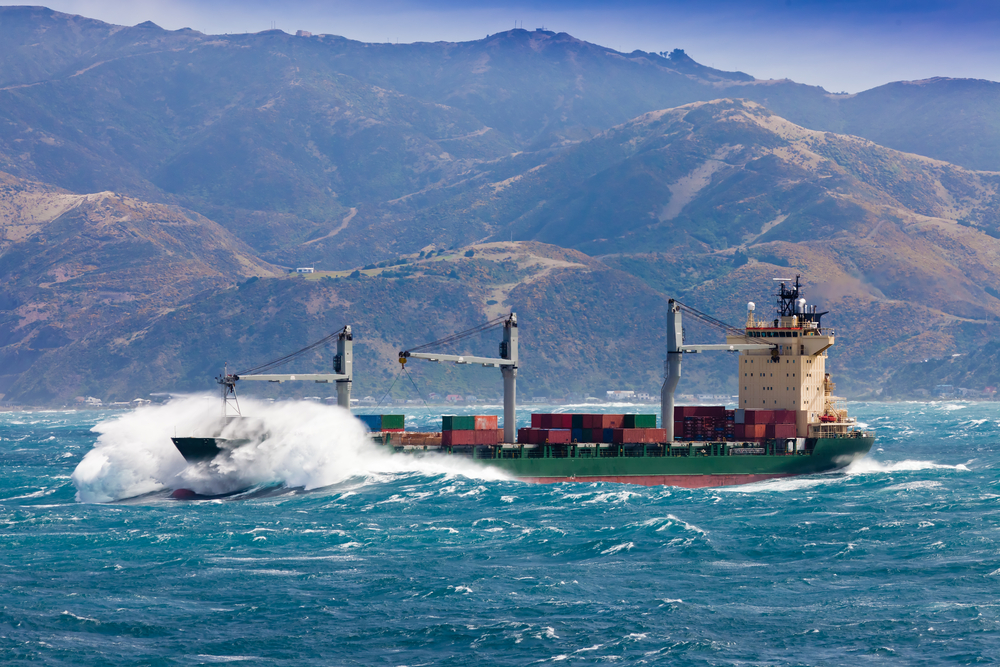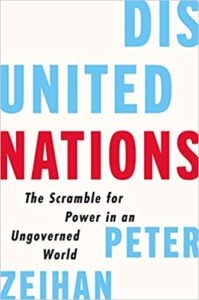Order and the Wealth of Nations
By Arnold Kling


- Modern manufacturing is a logistical marvel that taps hundreds of facilities in dozens of countries, but that system is based on frictionless international trade. Break just a few links and the entire network collapses. A modern car has about 2000 parts. If you are missing ten, you’ve got a large paperweight.
- Peter Zeihan1
Adam Smith and David Ricardo pointed out how important specialization, division of labor, and comparative advantage are to economic well-being. Austrian economist Eugen von Bohm-Bawerk characterized the use of capital as “roundabout production,” which makes it analogous to trade. We can produce wheat in a roundabout manner by first producing the capital equipment called a tractor. And the farmer obtains the tractor through trade—by selling wheat to pay for a tractor.
In his recent book, Disunited Nations,2 Peter Zeihan argues that the world has enjoyed an unusual windfall from roundabout production since World War II, thanks to what he calls the Order. This is a trading system nurtured, protected, and regulated by the United States. Zeihan writes,
- What we think of as “free trade” is much more than “just” the regular exchange of goods and services. It is much more than getting the latest doodad via Amazon Prime. It is much more than globalism. It is a global management system. A global network. A global alliance. A global order.
After World War II, to deal with the threat posed by the then-superpower Soviet Union, the United States proceeded very rapidly to incorporate its former foes into its alliance system. For Germany, Japan, and other countries that participated,
- … it meant having access to all sea lanes and all markets and all resources all the time as if they had decisively won a global war… It no longer mattered if your lands couldn’t possibly sustain a growing population or if you had a wide-open border. For the first time in history, geography was put on hold… join the Americans’ new alliance against the Soviets, and you were secure, not just from the new Soviet threat, but from the old threats as well.
By 1991, the Soviet empire had collapsed. The near-term result was that the Order was enlarged by adding the former East bloc nations as participants. This, along with China’s willingness to integrate with capitalist economies, created an unprecedented situation in which cross-border trade became everywhere safe and regulated.
But the fall of the Soviet empire also took away much of the motivation for the United States to maintain the Order. Moreover, the recent fracking boom greatly reduced the importance to America of stable oil supplies from the Middle East.
Zeihan sees the United States retrenching generally, inexorably abandoning its role as guarantor of the Order. In his view, this makes it likely that old geopolitical conflicts will re-emerge: Russia and Germany will again be wary of one another’s designs for Eastern Europe. Japan and China will once more have disputes about control over nearby waters. Turkey and Iran will see opportunities to recover long-lost imperial glory.
Zeihan envisions a world in which sea lanes are no longer safe. The re-emergence of rivalry and conflict will reduce countries’ willingness to trade. He sees this undoing much of the gains that the world has made in recent decades in reducing poverty.
- Break down the global supply-chain system for fuels and fertilizers, and much of the world’s agricultural output becomes far less efficient. That’s the clinical way of saying that without the Order, a billion people are going to starve.
Each nation’s economic security will depend relatively more on its domestic resources. This will work to the relative advantage of the United States, France and Argentina, because of their ample high-quality farmland, low-cost internal transportation systems, relatively young labor forces, and relatively secure access to energy sources. China, which lacks all of those attributes, will be in trouble.
It is difficult for me to evaluate such predictions. Perhaps the descent into conflict and autarky is not so fore-ordained as Zeihan describes. Perhaps under the Order, countries became acculturated to not invading one another or raiding one another’s commerce. Perhaps governments will be inclined to obey the norms of the Order even in the absence of the American policeman. Perhaps the aging of populations around the world has created more pacifist societies.
Disunited Nations is written for a business or policy-oriented audience, not for academics. Zeihan’s prose is lively and snarky. It is not sourced or footnoted. (There are footnotes, but they just contain more snark.). He does not engage with alternative points of view.
What I nonetheless found provocative reading Disunited Nations were Zeihan’s hypotheses concerning two topics that pertain to liberty and prosperity. One hypothesis is that the scope for international trade, what Adam Smith called the extent of the market, is widest under a hegemonic, even imperial arrangement. The other hypothesis is that the transition to smaller families is tied to urbanization.
Zeihan is not alone in his view that trade flourishes under a dominant empire. In Power and Plenty,3 Ronald Findlay and Kevin H. O’Rourke coined the term “pax Mongolica” to describe the economic benefits they argue that Genghis Khan brought when he established control over the Eurasian trade route.
In contrast, other historians emphasize the benefits of state rivalry. For example, in Escape from Rome,4 Walter Scheidel argues that “competitive fragmentation of power” is most conducive to innovation and economic growth.
One can provide theoretical arguments for either point of view. The static efficiency of the world economy may well be highest when trade routes are safest and societies can maximize the benefits of division of labor, specialization, and comparative advantage. One monopolistic “stationary bandit” may impose lower costs than competitive, war-prone “roving bandits.”5
The dynamic efficiency of the world economy may well be enhanced by competition, and even arms races, among states. State leaders who view their peers in other states as threats may take a more tolerant and encouraging stance with regard to innovation and dynamism than if they felt completely safe in the international environment. In the latter case, leaders might prefer to quell any innovation that could disturb the status quo.
Suppose that Tyler Cowen (The Great Stagnation) and Ross Douthat (The Decadent Society) are correct that we have gained affluence but lost our innovative edge in recent decades. Zeihan would say that these developments both reflect the Order. And he predicts that this will soon change. But he would focus on the loss of well-being from the collapse of the Order rather than on any possible benefits that might come from a more fragmented state power system, with societies perhaps placing a higher priority on innovation and having more tolerance for risk than is the case today.
The demographic transition, in which countries experience a significant drop in birth rates, has many possible causes. As societies become more affluent, infant mortality falls. Parents seem to increasingly focus on the quality of life that they can provide for their children, rather than on the quantity of children. As women become more educated, they tend to prefer to spend less time on child rearing and more time in the labor force.
Urbanization is another phenomenon that correlates with economic development. And Zeihan sees urbanization as an important driver of the demographic transition. Crowded, expensive cities are a deterrent to having large families. In a typically pithy sentence, he writes
- On the farm, we marry young, we work young, and die young. In the city, we marry old, work old, and die old.
Zeihan points out that very highly urbanized countries, such as Germany and Japan, are faced with shrinking native populations, as birth rates have long been below the replacement rate. He argues that neither Germany’s strategy of welcoming immigrants nor Japan’s strategy of deploying advanced automation is likely to solve the problem of a rising number of elderly dependents relative to the size of the working-age cohort.
It occurs to me that the outlook for the population of Africa will depend on the relative effects of economic growth and urbanization on family size. Suppose that urbanization in Africa proceeds more rapidly than economic growth. If urbanization matters most for family size, then the demographic transition will take place there relatively soon. But if the demographic transition will not happen until Africa has a much larger middle class, then family sizes may continue to be large there for several decades.
I would like to see rigorous exploration of the hypotheses put forward in Disunited Nations. But better to offer deep hypotheses with shallow analysis than the other way around.
Footnotes
[1] Peter Zeihan, “The ‘gift’ of the coronavirus,” March 6, 2020.
[2] Peter Zeihan, Disunited Nations: The Scramble for Power in an Ungoverned World, Harper Business 2020.
[3] Ronald Findlay and Kevin H. O’Rourke. Power and Plenty: Trade, War, and the World Economy in the Second Millennium. Princeton University Press, 2009.
[4] Walter Scheidel. Escape from Rome: The Failure of Empire and the Road to Prosperity. Princeton University Press, 2019.
[5] For further discussion, see “How the State Has Grown to Be the Monster We Know: Bertrand de Jouvenel’s On Power,” Pierre Lemieux’s Liberty Classic review of On Power.
*Arnold Kling has a Ph.D. in economics from the Massachusetts Institute of Technology. He is the author of several books, including Crisis of Abundance: Rethinking How We Pay for Health Care; Invisible Wealth: The Hidden Story of How Markets Work; Unchecked and Unbalanced: How the Discrepancy Between Knowledge and Power Caused the Financial Crisis and Threatens Democracy; and Specialization and Trade: A Re-introduction to Economics. He contributed to EconLog from January 2003 through August 2012.
Read more of what Arnold Kling’s been reading. For more book reviews and articles by Arnold Kling, see the Archive.
